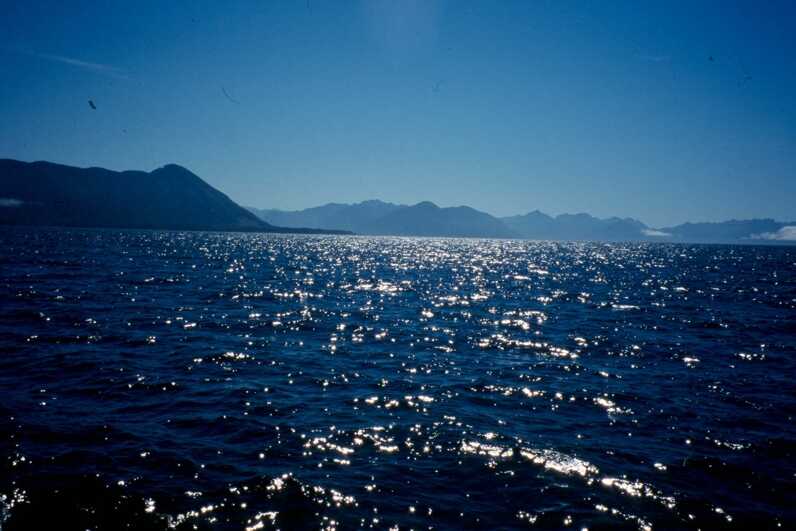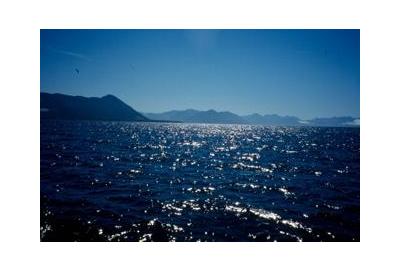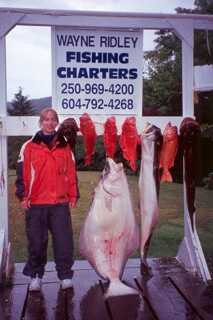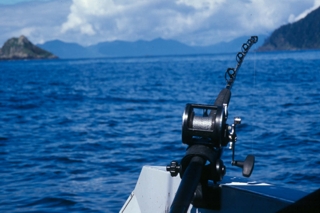I've been going back and forth to the coast for many years and it's always a thrill to look down into the water and see the mottled brown diamond shape twisting and turning on my line. Halibut are sought after and with a little perseverance, they can be caught. The hardest thing about catching halibut is locating them and sometimes this requires a lengthy boat ride out into the pacific. Big halibut are often deep dwellers that make forays into the shallows to feed.


Shallow water is a relative term. When I'm speaking of shallows, I am relating it to surrounding deeper water and if things are ideal, I'm speaking of fishing the edge of the continental shelf. On this edge is where I've had the absolute best halibut fishing, not necessarily for numbers, but definitely for size. I've fished North of Prince Rupert, around Rivers Inlet and my favorite location, fishing with Wayne Ridley of Wayne Ridley's Fishing Charters out of Winter Harbour on the northwestern tip of Vancouver Island. In spite of the massive distances between them, everyone seemed to fish halibut the same way. First, halibut primarily feed on the bottom so anchoring in a prime location is ideal. Second, depth is a consideration. While sometimes these underwater shallow shelves are less than 200 feet deep, and in one instance, we were fishing in 100 feet of water, most halibut fishing is done in that 260 to 330 foot range.
This depth just happens to coincide with the depth that the continental shelf typically drops off. Fishing on the top edge of this drop off is prime halibut territory. Once the edge has been located, it's then a matter of watching the sounder and GPS to find a protrusion, which will act as a natural funnel to the fish. Find this and more often than not good fishing will follow. This is the spot to anchor and set up.
When it comes to fishing, the right tackle is critical. A salmon rod doesn't cut it. Try levering up a 80 pound halibut on a whippy rod and stretchy line. It doesn't work very well and odds are the fish will win.
To bring halibut up, it takes no stretch line, a big reel and a stout rod. Halibut rods are stiff and are meant to be that way to lever big fish off the bottom. My line of choice is Berkley Tough Line. I run 80 pound Tough Line. My buddy Wayne Ridley, who guides off northern Vancouver Island, runs 100 lb Tough Line. The line has to be no stretch and a thin diameter. It means that it can get down to the bottom and, because of its 'thinness', it will cut the current better when the tides move in and out. This means direct contact with the bait and positive hook ups when a halibut does hit. The reel can be any reputable reel, just so long as it can handle the stress of some heavy drag. Typically the drag is set somewhere around 60 pounds. A fish has to put a lot of muscle into the fight before the reel will give up line.
On the terminal end, do not fool around. Go to bait and perhaps the most reliable bait is salmon belly. The skin on salmon belly is tough so fish can't shred it up or pull it off the hook when biting.
This little tidbit of info becomes extremely well appreciated when, after a bite, I don't have to pick up the rod then reel a one or two pound weight 300 feet up to the surface to see if the bait is still on. The belly meat is also oily, which is very alluring to a halibut or any other fish. If salmon belly is not available, the next readily available bait is full size herring, but herring are fragile. Because of this, it requires reeling in after every good bite, which becomes a lot like work. I've seen octopus used as bait. Again this bait is durable, the whole problem becomes, where and how do you catch an octopus to use?
The bait is set up on a spreader bar rig and typically circle hooks are the hook of choice. The simple fact is when a fish gets hooked with a circle hook, they rarely get free. Using circle hooks comes with its own tricks. The most important has to be how to hook the fish. In the life of a circle hook, the fisherman, or fisherwoman does not set hooks. The fish sets the hook. The design of the circle hook means the hook will slide out to the corner of the halibut's mouth and when it reached that edge, the hook will rotate and dig in, hooking the fish neatly and securely in the jaw.
The best time to catch halibut is the one to two hours before and after the tide change. On either side of the change tidal currents flow onto or off of the shelf and the fish will work the edge feeding as they go. When it's slack tide, pull the anchor and do some salmon fishing for an hour. The halibut are not active, but conveniently the salmon will be.
When dropping baits to the bottom, often times the first fish to bite will be the red snapper. Red snappers are a good sign and I will usually pick up a few quickly.









